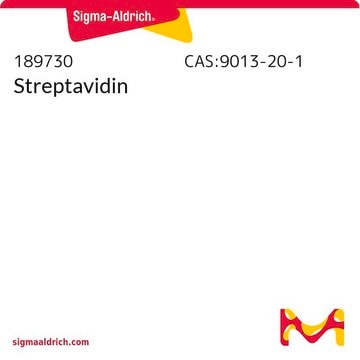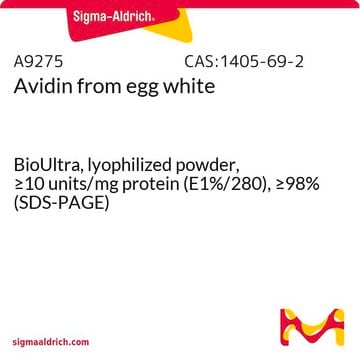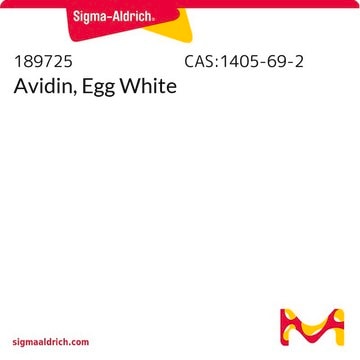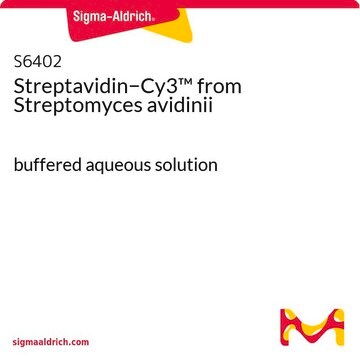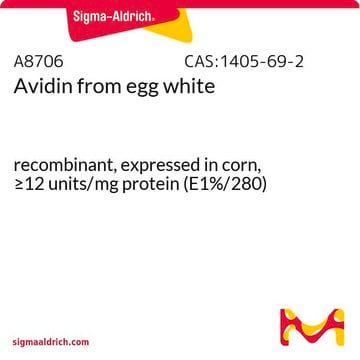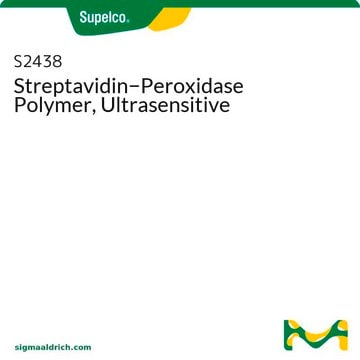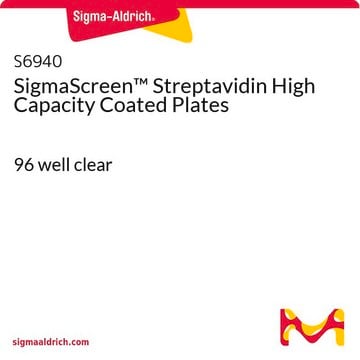SA101
Streptavidin
5 mg Streptavidin for ELISA & Western Blotting.
Synonym(s):
Biotin-Binding Protein, Streptavidin Protein
Sign Into View Organizational & Contract Pricing
All Photos(1)
About This Item
UNSPSC Code:
12352202
eCl@ss:
32160405
NACRES:
NB.22
Recommended Products
conjugate
unconjugated
Quality Level
manufacturer/tradename
Chemicon®
technique(s)
ELISA: suitable
western blot: suitable
shipped in
wet ice
General description
Streptavidin is a tetrameric protein with a globular structure. It is isolated from the bacterium Streptomyces avidinii. Streptavidin is highly thermostable and is resistant to extreme pH, organic solvents, denaturants, detergents, and enzymatic degradation.
Application
Streptavidin has been used to saturate supported lipid bilayers (SLBs) during its preparation.
Biochem/physiol Actions
Streptavidin is widely used as a linker in biotechnology as it forms a very stable bond under well-preserved biological conditions. It exhibits a high binding affinity for biotin. This feature of streptavidin makes it a very efficient and versatile tool for the development of novel sensors. Streptavidin-biotin system is also used in various chemical and biological applications such as detection, labeling, and drug delivery.
Legal Information
CHEMICON is a registered trademark of Merck KGaA, Darmstadt, Germany
Disclaimer
Unless otherwise stated in our catalog or other company documentation accompanying the product(s), our products are intended for research use only and are not to be used for any other purpose, which includes but is not limited to, unauthorized commercial uses, in vitro diagnostic uses, ex vivo or in vivo therapeutic uses or any type of consumption or application to humans or animals.
Storage Class Code
11 - Combustible Solids
WGK
WGK 3
Flash Point(F)
Not applicable
Flash Point(C)
Not applicable
Certificates of Analysis (COA)
Search for Certificates of Analysis (COA) by entering the products Lot/Batch Number. Lot and Batch Numbers can be found on a product’s label following the words ‘Lot’ or ‘Batch’.
Already Own This Product?
Find documentation for the products that you have recently purchased in the Document Library.
Customers Also Viewed
Bioengineered approaches for site orientation of peptide-based ligands of nanomaterials
Biomedical Aspects of Botulism, 139-169 (2018)
Xiao-Yun Lu et al.
Progress in molecular biology and translational science, 104, 299-323 (2011-11-19)
Over the past few decades, interest in designing and developing polymeric nanoparticles has undergone considerable explosion. Indeed, these nanoparticulated polymer-based systems provide potential solution to improve therapeutic efficacy and diagnosis sensitivity. In this chapter, general properties, production, and characterization of
Roxanne Glazier et al.
Nature communications, 10(1), 4507-4507 (2019-10-20)
Podosomes are ubiquitous cellular structures important to diverse processes including cell invasion, migration, bone resorption, and immune surveillance. Structurally, podosomes consist of a protrusive actin core surrounded by adhesion proteins. Although podosome protrusion forces have been quantified, the magnitude, spatial
Christopher M Dundas et al.
Applied microbiology and biotechnology, 97(21), 9343-9353 (2013-09-24)
Streptavidin and its homologs (together referred to as streptavidin) are widely used in molecular science owing to their highly selective and stable interaction with biotin. Other factors also contribute to the popularity of the streptavidin-biotin system, including the stability of
Our team of scientists has experience in all areas of research including Life Science, Material Science, Chemical Synthesis, Chromatography, Analytical and many others.
Contact Technical Service